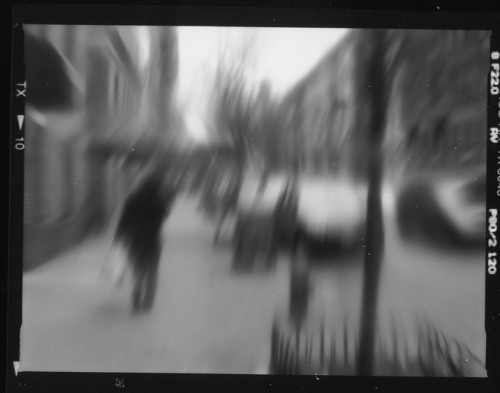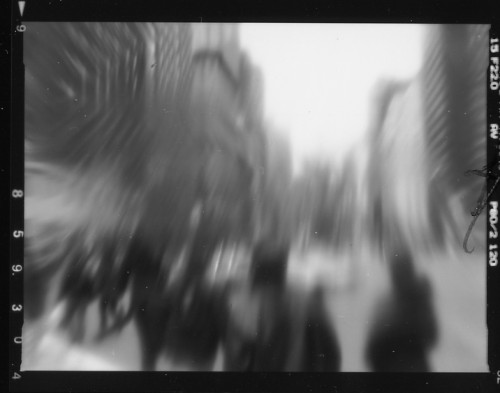It’s hard to believe it’s been 15 years since 9/11. This morning, I went to a memorial service with Jessie, and looked hard at the pictures there of first responders who died when the towers collapsed. I tried to imagine their families, the lives and dreams that were taken away from each of them. I thought about what the city was like that day, and what it was like in the weeks and months and years that followed.
Five years ago, I wrote a piece here reflecting on the tenth anniversary of 9/11; I’m posting it again today. Never forget.
###
On September 11, 2001, I came into my office early, to follow the market, to watch the tech bubble slowly implode on the monitors in our bullpen that perpetually played CNBC and CNNfn.
I can picture our small company that morning, gathered in twos and threes around those monitors, as video played and replayed the first plane crashing into the North Tower.
We were still gathered around those monitors when the second plane hit, as we slowly realized that neither strike had been a mistake.
We were still gathered around those monitors, an hour later, when the South Tower collapsed.
##
Shortly after the second plane hit, I called my parents’ house in California. My father picked up. “I’m okay,” I told him. “I just called to let you know I’m okay.”
“That’s great,” my father said, still asleep, not understanding why I was calling. “I’m okay, too,” he said, before hanging up.
##
We were evacuated from the office before the second tower came down. We were a half block from Grand Central Station, and police feared an attack on that similarly iconic target.
Still, after I made it downstairs, I stood on the street corner by our office for at least fifteen minutes, looking downtown, watching smoke billow. Gusts of wind brought an acrid smell, a fine coating of ash.
I worked the game theory in my head: my apartment, nearby, was across the street from the United Nations, clearly unsafe. Some of my office-mates were headed to an evacuation center the city had set up at a West Side high school. But any terrorist group sophisticated enough to mastermind this complex an attack would have also known where large groups of evacuees would be directed by city plan, where they would gather as sitting ducks.
I stayed away from my home and from the evacuation centers. I stayed away from crowds, from city landmarks. I headed west, then north. I stayed away from the tall buildings of Midtown, from the crowds of Times Square, from picturesque Columbus Circle and Central Park.
By quiet side streets, I headed up to Harlem. There, I wandered, dazed, from one block to the next, listening to the news with groups gathered around radios on old buildings’ front stoops.
##
Late in the evening, I headed back towards my apartment, showing my ID to dozens of policemen as I inched closer to the UN.
Along the way, I reached my parents again briefly. Now, understanding, they were effusive in their relief.
Once home, I fell asleep nearly before my head hit my pillow. I slept badly, fitfully. And briefly: we were evacuated from the building early the next morning.
I headed to work, but after an hour, we were evacuated from there, too.
For days in a row, I was evacuated from one, and then the other. Unsure of what to do, I wandered the streets, still dazed. I considered heading out to relatives in New Jersey or on Long Island, but transportation was a mess. Besides, though I had only been here for three months, I already knew that New York was my city. I couldn’t simply leave it behind.
##
Months later, I was asked to contribute photos for a gallery showing of young New York photographers reflecting on the city in the wake of 9/11.
I thought about that week wandering, about how little I remembered of it. Where had I gone all day? What had I thought about?
I made two images for the show.


##
I visited my brother, a freshman at the University of Denver.
A woman who checked my ID there saw I was from New York and asked if I had been in the city during the attacks. I had, I told her.
“Even if we weren’t there, all of us were New Yorkers that day,” she said.
##
On the first anniversary of 9/11, I headed to the roof with my trumpet and played Taps facing downtown. I read the Mourner’s Kaddish, a Jewish prayer of remembrance.
I did that each year, until the fifth anniversary.
On the sixth, I didn’t.
##
In the wake of 9/11, we came together in a way that still awes me: with heroism, generosity, and community. We love our country. And, even if we don’t always show it, we love each other.
Yet much of what has come after 9/11, of what has been done in its name, has troubled me deeply: from the security theater of the TSA and the Orwellian Department of Homeland Security, to the serious violation of citizens’ civil rights by programs like the CIA’s warrantless wiretapping and the even more serious violation of others’ human rights at Guantanamo and through programs like extraordinary rendition.
We’ve slid slowly towards a security state, yet we remain ultimately insecure. We’ve run afoul of framer Benjamin Franklin’s cutting remark: that “they who can give up essential liberty to obtain a little temporary safety, deserve neither liberty nor safety.”
We’re now permanently at war. We piss away lives and hundreds of billions of dollars yearly, in Iraq, Afghanistan, Pakistan, Libya, and elsewhere. We have no clear objectives there. We have no clear exit criteria.
Like Britain during the Boer War a century before, we’ve spread ourselves too thin, have begun to underfund crucial long-term investments at home, like education, infrastructure, and scientific research, in favor of fleeting yet ever-expanding pursuits abroad.
Historians often argue it was the Boer War that ultimately ended the British Empire; I wonder if, a hundred years from now, historians will reflect similarly on our War on Terror.
##
A few weeks ago, Air Force pilot Chris Pace contacted me about a 9/11 fundraiser bike/run he was doing to benefit the Disposable Heroes Project, a nonprofit that supports wounded veterans from Afghanistan and Iraq, where he had done four tours of duty.
His plan was simple, albeit vaguely insane: leave Arlington Cemetery by bike on the evening of Friday, September 9th, bike 150 miles, then dismount in New Jersey and run 100 miles, all without stopping to eat or sleep, to arrive in New York City on the morning of September 11th.
He had been training for this simply by doing CrossFit workouts. So, he wanted to know, would it be okay if he used my gym, CrossFit NYC, as the endpoint of his run?
Obviously, I said yes. But I also thought about the patriotism and generosity and welcoming sense of community, that feeling of being in it together, that had made me proudest in the wake of September 11th.
So, this morning, I woke up at 4:30am, and met Chris (and his support crew) as he crossed the Verrazano Bridge into Brooklyn, to welcome him to New York, and to show him our support, by running with him for the final 12 miles.
##
After we made it to the gym, after we hooked Chris into an IV to rehydrate him, then packed him into a car to his hotel so that he and his crew could get some much-needed sleep, I hailed a cab home.
The driver asked what I had done that morning, so I told him. I told him about Chris’ 250 mile trip, about my joining him for the last New York stretch.
“Your friend,” said the driver admiringly. “He is very strong.”
Yes, I agreed.
“Not just body strong,” said the driver. “Strong in heart.”
The driver told me he was from Mauritania. And that, back there, ten years ago, his brother had similarly biked a 150 mile round trip, to and back from the capital. But there, he said, nobody had been proud; instead, they had been angry.
“We thought it was embarrassment!” he laughed. “We say, who bike 150 miles? Only poor people who have no car!”
But now, this driver told me, he thought about that differently. He thought about a lot differently. For ten years in the US, he had been able to consider his country from a distance. And he’d been able to consider this one with an outsider’s eye. He told me that each had good and bad. And that, for those ten years, he had thought carefully about where there was more bad, where there was more good. And, earlier this year, he had become a citizen of the United States.

